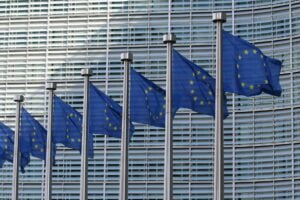This content was created by the Data Sharing Coalition, one of the founding partners of the CoE-DSC.
The Data Sharing Coalition supports organisations with realising use cases at scale to exploit value potential from data sharing and helps organisations to create required trust mechanisms to share data trusted and secure. In our blog section ‘Q&A with’, you learn more about our participants and their thoughts, vision and ideas about data sharing. In this Q&A, Pieter Hoenderken, Managing Director of Impact IoT Solutions, shares their thoughts.
1. Could you introduce your organisation?
Our organisation consist of three companies. Impact IoT Solutions focuses on R&D and is a participant of the Data Sharing Coalition. Impact Smart Products is the sales organisation and Impact Data Platform delivers data services to the other two. Impact IoT Solutions is an innovative and ambitious Dutch R&D company, active within a wide range of sectors, such as – but not limited to – agriculture, logistics, and construction. We support organisations by offering custom-tailored Internet of Things optimisation of processes and activities. We also offer advice about how to optimise business processes. We perform a company scan, which in turn exposes the activities that can profit from smart IoT optimisation. Digitising processes applies to the entire chain, from machine/sensor to connectivity, and processing data.
2. To what extent is your organisation involved in data sharing (within and across sectors)?
We create solutions for various branches, agriculture, logistics, and energy amongst others. In all these branches, we share data among and between various companies. Take for example the recent transition to using hydrogen in houses. It is essential to share data and knowledge about the use of hydrogen to gain more knowledge about the use of hydrogen, so we share usage and sensor data with owners of the infrastructure, a university, and partners. Each party involved looks at the data from its own perspective: the network operator looks at usage, the installer at the pipelines, and the implementation department looks at safety. By combining this data and sharing knowledge, we can help with this transition.
For the logistics domain, we are working on a solution that provides data about the state of short-lived, perishable vegetables and fruits during the whole transportation journey, from farmer to retailer. Various stakeholders are involved in the transportation of fruit, for example the supplier who wants to deliver a good product and the retailer who wants to see what happens with the purchased product. Currently, the quality of fruit and vegetables during transportation is not being monitored. The transportation phase is a ‘black box’. If stakeholders gain insight into the journey of fruit and vegetables, action can be taken during the transportation phase when needed to reduce food waste.
In the agriculture sector, together with the Data Sharing Coalition, we are working on a use case to predict the health of cows. Data that provides insight in the health of cows is shared with farmers, veterinarians, and feed producers. If we can predict which cow is at risk of getting sick, the farmer or veterinarian can prevent the cow from being sick. We don’t share data, but we make use of all available data sources that provide insight into the health of the cow.
Setting up good architecture is a major concern. Why? If you want to share data and unlock its true value, the right principles need to be in place.
3. Why is or should sharing data be important for your industry or domain?
By sharing data, innovation is possible. We can better coordinate processes and make them more efficient. Furthermore, we can gain insight based on data and use this to create new revenue models. Take for example the use case we are working on together with the Data Sharing Coalition about data-driven agriculture. We help the farmer to prevent a cow from becoming sick by making use of data sources that provide insight into the health of the cow. This helps the farmer to remove the cow from the heard and treat it before the cow becomes really sick.
4. What are the most promising data sharing developments and trends you see in your sector?
A promising trend is that the willingness to share data is increasing, due to pressure from customers or other stakeholders. Five years ago, sharing data was unthinkable. Every organisation that collected data thought they owned the data instead of the farmer. Nowadays, farmers are much more aware of the value of their data and they know that, by combining data, they can arrive at different insights compared to looking at one data source. Because of this shift in the mindset of the farmer, companies like Nedap and Lely now offer various interfaces so the data can be used for other purposes. Nedap, for example, sells a solution that tells the farmer when to inseminate a cow based on the activity of that animal (e.g. how much the cow walked that day). This activity data can also be used as an indicator of illness when combined with other data.
5. How do you see the future of data sharing, and what steps are you currently taking in that direction?
I am not sure about the future, because the transition of data to information and insights has impact on companies who share data. We are now working on a number of projects in which we want to either receive data from others (data-driven agriculture) or share data with others (vegetables and fruit). Setting up good architecture is a major concern, both now and in the near future. Why? If you want to share data and unlock its true value, the right principles are essential and need to be in place for successful data sharing.
6. Why are you participating in the Data Sharing Coalition?
We joined the Data Sharing Coalition to learn more about all the important elements that need to be in place to share data. One of those elements is the creation of a data architecture, which is essential to be able to share data. Agreements that need to be made to share data and agreements about security aspects are also important. In addition, we want to share knowledge about the use case we are working on, which focusses on data-driven agriculture. And last but not least, we also want to gain knowledge from other use cases to improve our own projects.




